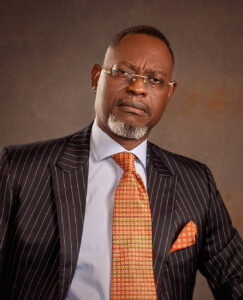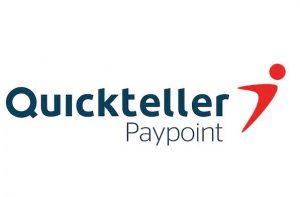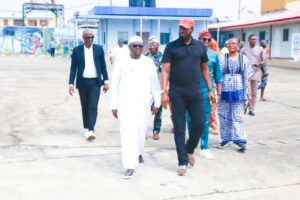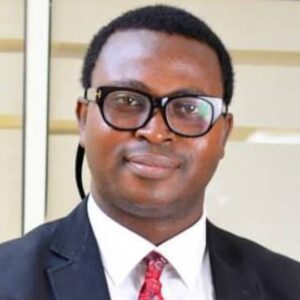Abuja Business Summit: Soludo Urges Local Investment as Wike Unveils Infrastructure Plans to Boost Investments
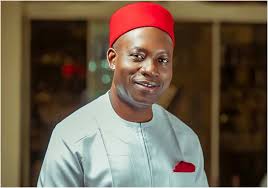
Soludo
Samuel Mobolaji
The summit, held in Abuja, brought together stakeholders from various sectors to explore investment opportunities in Nigeria’s capital city.
Wike, in his address, called on investors to explore Abuja’s potential as a key investment destination.
Speaking at the event, with “The theme, Optimising Investments Through Partnership, resonates deeply with our vision for the Federal Capital Territory (FCT) as a thriving hub for business and innovation,” Wike stressed the importance of collaboration, noting that partnerships would drive innovation and efficiency, key to the nation’s economic growth.
Wike highlighted Abuja’s potential, calling the FCT not only Nigeria’s political capital but also an untapped reservoir of opportunities across sectors like real estate, technology, agriculture, healthcare, and renewable energy.
“Our unique position, strategic location, and growing population create a fertile ground for investment,” he remarked.
He also revealed the Administration’s plans to flag off the construction of nine major infrastructure projects next week, which he said would enhance connectivity and attract further investments.
The FCT Minister emphasized that security remains a top priority in attracting investments, stating, “We have made considerable strides in enhancing security measures across the FCT, collaborating with law enforcement agencies to ensure a secure environment for businesses to flourish.”
He reassured the audience that the government is committed to providing a safe and enabling environment for investors.
Wike also emphasized the FCT Administration’s commitment to innovation and entrepreneurship, particularly through initiatives aimed at empowering small and medium-sized enterprises (SMEs). “SMEs are the backbone of our economy,” he said, noting that by providing funding, training, and resources, the government aims to cultivate a robust ecosystem that drives economic growth.
Furthermore, Wike invited all participants to collaborate with the FCT Administration to create value, generate jobs, and stimulate economic growth in line with President Bola Ahmed Tinubu’s Renewed Hope Agenda. He added that partnerships with both local and foreign investors are crucial in this mission.
Governor Charles Soludo’s speech took a more philosophical tone, focusing on the importance of Nigeria First in the nation’s economic strategy.
Soludo argued that foreign companies are often opportunistic and have no emotional ties to the country, saying, “If you see the companies that have pulled out of Nigeria, how many of them are national companies? None. But the foreign companies, they have itchy feet.”
He emphasized the need for Nigeria to nurture its domestic capital, as nationals have a higher risk appetite and are more invested in the country’s long-term growth.
Soludo went on to stress the importance of promoting African capital and trade, urging the audience to build domestic capital as a foundation for foreign investment.
“We must build the African capital as the frontier capital that would lead even the other foreigners to come in,” he stated.
According to Soludo, foreign investment alone is insufficient for Nigeria’s economic sustainability, and the country must focus on growing its local economy.
One of the highlights of Soludo’s speech was his call for Nigerians to support local products.
He passionately declared, “The biggest way to promote massive investments in all sectors in Nigeria is to buy, eat, drive, drink made in Nigeria.”
He underscored this by sharing how he drove to the summit in an Innoson vehicle made in Anambra State, wore Akwete fabric made by women in Abia, and was committed to promoting Nigerian-made goods.
Both Wike and Soludo underscored the critical role of infrastructure and security in driving investment.
Wike assured the audience that Abuja is prepared for business, citing streamlined processes and partnerships through the Abuja Investment Company Limited and the Abuja Enterprise Agency to support investors.
“We have streamlined our processes to make it easier for investors to set up and operate,” he said, inviting the audience to explore opportunities in real estate, technology, and agro-business.
Soludo, meanwhile, urged for a more inward-looking approach, emphasizing the importance of developing home-grown industries and businesses.
He reiterated the need for the government to de-risk certain strategic investments to encourage private sector participation, especially in manufacturing and industrialization.
“For long-term sustainability, we must intentionally nurture the domestic capital and build them,” he stated, warning against over-reliance on foreign investment.
He, however, emphasized the competitive nature of globalization but warned that it should not come at the cost of domestic industries.
“No matter how you think about globalization… populations are still confined within nation-states. The government must provide jobs for those people,” he concluded.


